Turn Scents Into Dollars: How to Start a Candle-Making Business (Plus Examples From Top-Selling Candle Brands)

If you’re an entrepreneur who is eager to burn the midnight oil with a new business venture, we’ve got a potential business idea for you: homemade candles.
When it comes to creating a product that’s practical and hot (literally and figuratively), learning how to make candles is a skillset that’s useful even for the hesitant DIYer.
So, if you’re curious about how to make homemade candles and start a candle business, let’s look at how you can make money online with this trending product.
Start selling candles online 🕯️
Free Webinar:
Marketing 101
Struggling to grow sales? Learn how to go from first day to first sale in this free training course.
Why make and sell homemade candles?
Homemade candles have become an essential home decor item—an industry expected to reach $5 billion by 2026, according to MarketWatch. In past years, the commercial use of candles has seen a sharp increase, with spa and massage using scented candles for soothing effects, and restaurants creating aromatic environments for customers.
Consumers also buy candles as a focus point for their home decor, as well as for aromatherapy like relaxation and stress reduction, according to the National Candle Association. Taking a quick look on Google Trends shows us that global interest for homemade candles is consistent:

And while candles may be used for various purposes across the globe, most of the searches for homemade candles are concentrated around North America, the UK, and Australia. This is great intel for candlemakers looking to find a market for their DIY products:
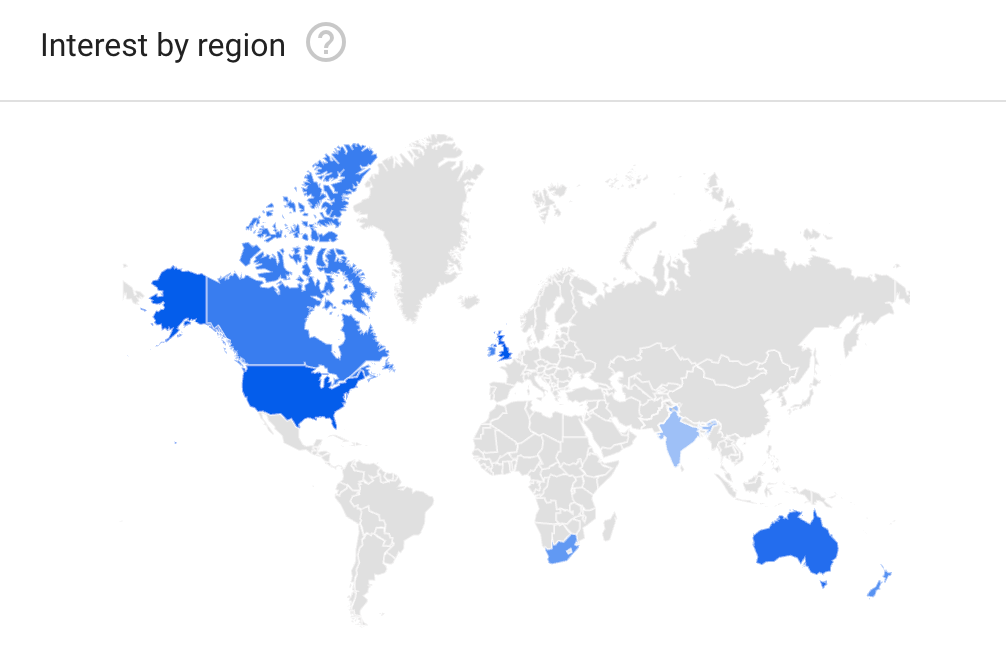
Next, Google Trends demonstrates plenty of interest in specific types of candles—from scented to soy and everything in between. Shoppers’ interest in candles is not only strong, but runs the gamut.
So, when an eager entrepreneur is making decisions about what kind of products to create, this knowledge is a powerful insight to help you build a collection that resonates with potential customers.
In addition to the popularity of this hot product, candles offer business owners a number of other benefits, including:
- Low cost entry. Granted, some homemade candle varieties require pricier materials than others, but in general, candlemakers can create their wares with very little cash up front.
- Easy to sell anywhere. Want to sell your home decor items at craft fairs and local markets? Homemade candles travel well, so you can sell them both online and offline.
- Scalable craft to learn. Whether you’re a DIY master or a crafting newbie, the base recipe for basic candles is easy to follow. As you’ll notice from our handy infographic below, the formula is simple.
- Easy to customize. With so many types of candles, it’s easy to personalize your products and differentiate yourself from direct competitors.
From the standpoint of a DIY business, learning how to make candles is a skill that can be transformed into a viable income stream. But before we tackle the topic of creating homemade candles of your own, let’s take a look at the popular types that are piquing shoppers’ interest.
Types of homemade candles
One of the big advantages when it comes to making candles for your business is the variety—there’s likely a type of candle out there that will catch the eye of any potential customer.
Not sure where to start? Here are some of the top types of homemade candles you can explore when planning your candle business opportunities.
Soy candles
One of the hottest candle varieties on the market today, soy candles are made from a base of soy wax. This wax is derived from soybeans and, therefore, is made from vegetables (opposed to regular oil- or paraffin-based candles). The soy wax segment is expected to grow at a compound annual growth rate of 8.5% from 2019 to 2025, according to Grand View Research.

Not only are soy candles made from a renewable resource, they also burn cleanly and for longer. That way, customers get more bang for their buck when it comes to getting a longer-lasting candle.
Scented or aromatherapy candles
This is one of the most common varieties of candles. Scented or aromatherapy candles offer a spectrum of scents for customers looking to spruce up their homes with pleasant smells.
Whether they’re meant to mask a normal household stench or simply create a unique scentscape, these candles come in dozens of scents—so there’s a smell that will appeal to almost everyone.
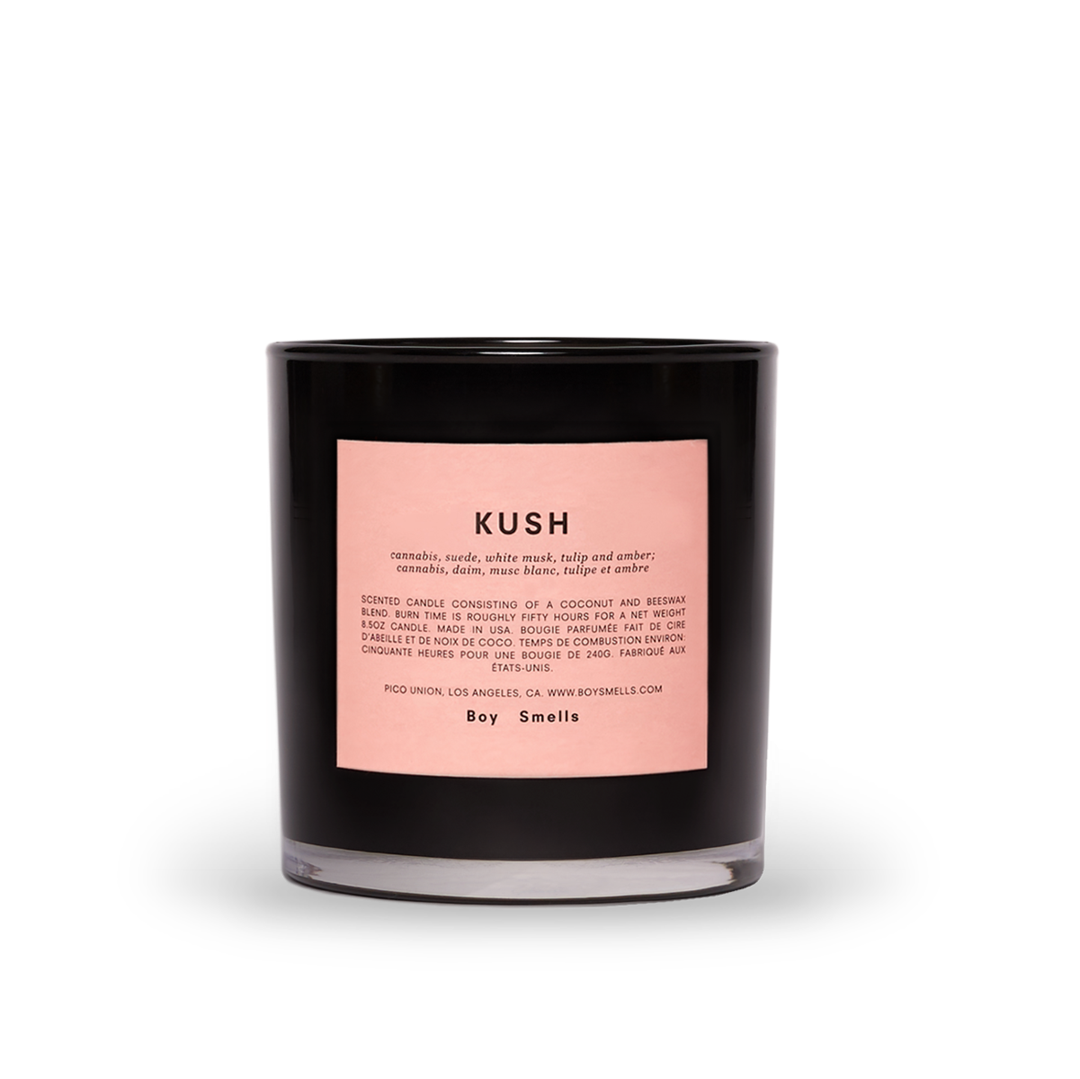
Aromatherapy candles makers market their products as offering specific benefits that correlate to certain scents. Generally, the recipes for these candles use essential oils that are meant to enhance physical or mental well-being. For example, lavender scents are often associated with relaxation.
Vegan candles
There’s a growing segment of shoppers that are concerned with the materials businesses use to make their products—particularly any animal ingredients. Basic candles often contain animal byproducts like beeswax, which isn’t desirable for some consumers.

But here comes vegan candles to the rescue! Vegan candles use modified formulas with ingredients like soy wax, plant-based waxes, fragrance oils, and natural fragrances.
Decorative candles
When entering a homeware store, you’ve likely noticed candles that come in many colors, shapes, and sizes. Some candles are made purely for decorative purposes—they aren’t necessarily scented and aren’t made from special ingredients. They simply add a certain something to a space in your home.

Decorative candles often come in complicated shapes, feature accessories, and employ complicated designs.
How to start a candle business
Follow this step-by-step guide to create your own candle business today:
- Do market research
- Build your brand
- Create a candle business name
- Write a business plan
- Make candles to sell
- Build your online store
- Create a marketing plan
Do market research
Your target market are the people you want to reach with your marketing efforts. These are the buyers who will be most interested in your products and most likely to convert to customers. In the candle industry, target markets are broken down into three categories:
- Prestige. Luxury candles are a new and quickly growing segment of the candle market. Pricing may vary. The average prestige candle can sell for between 30 and 80 dollars, but can run as high as $185, like the Louis Vuitton perfumed scented candle. Prestige candles are known for their premium packaging, fragrances, and emphasis on brand storytelling.
- Mid-market. These mid-tier candles have broad appeal. You’ll likely find them in retail outlets like Target. Mid-market candles typically have unique scenes like rose water, grapefruit, or basil, and cost around $10 per candle.
- Mass market. These candles are the most affordable on the market. Brands like Yankee Candle and Bed Bath and Beyond take up most of this segment. You’ll find standard scents like vanilla or ocean breeze, and will cost around $5 to $8 per candle.
Decide on which market you’ll go after. Do you want to get into retail stores like Nordstrom or Macy’s? Then mid-market may be the best route. Want to only sell through your own website and other online boutiques? Prestige candles may be your calling.
Choosing your market will help with everything from sourcing materials to building your brand and packaging. Once you have a segment in mind, you’ll want to decide on the types of candles you’ll create.
While doing your research, note what kind of candles customers are buying. Are eco-friendly, vegan candles best suited for your market? Or are potential customers OK with paraffin wax candles, despite their impact on the environment.
The candles you choose to sell will determine the type of brand you create.
Build your brand
The second step in starting a candle making business is building a brand. A brand helps you build an audience, influences your marketing efforts, and makes it easier to create better products for your customers.
A good brand is crucial for candle businesses in particular. The industry has grown so significantly over the past decade that it can feel impossible to break in.
Let’s look at three ways you can stand out in the saturated candle market.
Unique and interesting fragrance blends
Fragrance is the most important buying factor for consumers today. Research by the National Candle Association shows that three-fourths of candle buyers say it is “extremely important” or “very important” in their selection of a candle.
One way to stand out from the competition is with interesting fragrances. Developing a new blend immediately carves a place in the market for you. Rather than offer standard floral and woodsy scents, opt for more complex and sophisticated smells buyers can’t find elsewhere: scents that make people think or remember something or feel a sense of mystery and intrigue.
Brand story
A brand story is the fastest way to connect with buyers. It’s a narrative that shapes and communicates your brand to people. It’s the foundation on which your mission, message, and voice is built.
Brand stories, especially in the candle business, are captivating, human, and honest. It should make people feel something, which then drives them to take action—whether it’s a signup, purchase, donation, etc.
Take Keap Candles story for example. The founders, Harry Doull and Stephen Tracy, were unhappy with their jobs in tech. They want to do something more meaningful and inspiring with their work and turned to candle making.
To find your story, ask yourself:
- Why am I making candles?
- Who am I making candles for?
- What impact do I want to have on them?
- What impact do I want to make on the world?
Visual identity
Your visual identity (which includes your logo, photography, website, social media, and packaging) is the most direct way to influence how people feel about your candle business.
When it comes to your candle brand, you want to pay close attention to the aesthetic of your products. Customers will use your candles for their scents and a home decor complement, so you want to design products in-line with your audience.
For example, Boy Smells brand is all about elevating your intimate world. They are bright, sensual, and accessible to all genders.

The brand’s visual identity embraces both masculine and femininity in a simple, straightforward way, empowering people from all walks of life, wherever they find strength. It adds this identity into all its marketing assets, from website to social media, as well as to over 300 retail locations worldwide.
Once you interact with Boy Smells, chances are you won’t forget it. That’s the power of strong visual identity.
Create a candle business name
At this point your candle business is shaping up nicely. You’ve probably come up with a few business names along the way, and now’s the time to decide on one.
Be sure to keep your candle business name ideas short and simple. That’ll make it memorable and easy for buyers to pronounce. If your name is too difficult to remember, you’ll miss out on free word-of-mouth marketing.
If you’re still stuck on a business name, use Shopify’s business name generator to stir up fresh ideas. All you have to do is enter a keyword, click Generate Names, then browse thousands of auto-generated name ideas for your company.
Write a business plan
A business plan guides your entire operation when creating a candle business. It helps define your strategy, pinpoint challenges, understand what resources you need, and analyze your business idea before launch.
Ask yourself: What is the end goal for my brand? Who are my direct competitors? Do I want to be sold in retail outlets like Target or Nordstrom? Or do I want to start an ecommerce store and sell directly to my customers?
Identify your business goals and keep them in mind as you build out your candle making brand.
Make candles to sell
As we’ve demonstrated, there are plenty of candle types you can create in your own kitchen. Here, we’ll show you how to make a basic soy candle. You can take the same basic ingredients, tweak them slightly, and create your own customized recipe.
Gather your materials
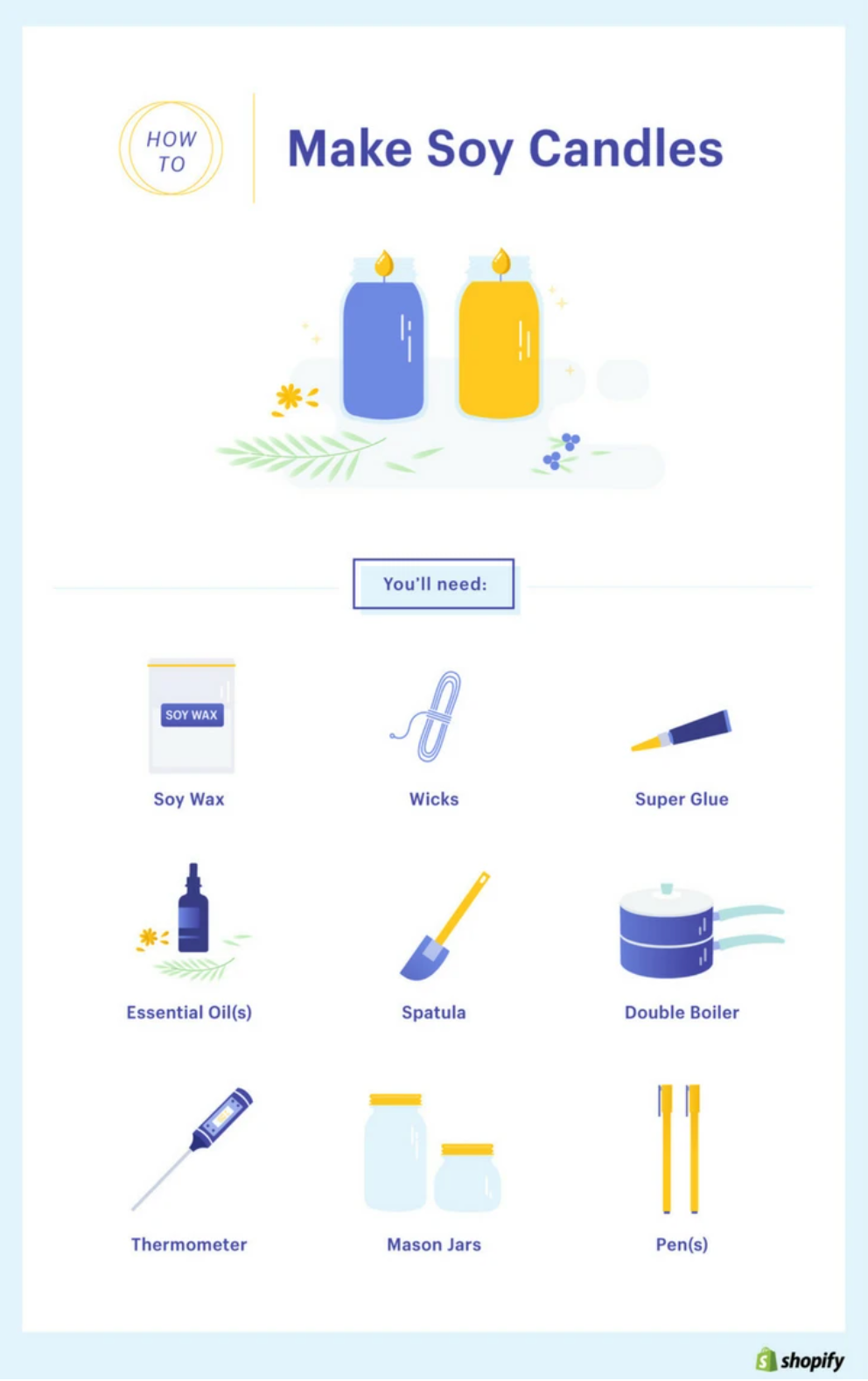
For this homemade soy candle recipe, you’ll need:
- Soy wax
- Wicks (preferably cotton)
- Super glue
- Essential oil of your choice
- Spatula
- Double boiler
- Thermometer
- Mason jar
- Pen or pencil
While you likely have some of these items sitting around your house, you can easily procure the rest without busting your budget. You can find soy wax in bulk on sites like AliExpress or Bulk Apothecary for around $4 per pound.
Merchants looking to source jars or other glass containers can look on AliExpress for a variety of bulk-buying options, or check their local thrift store or dollar store for inexpensive containers.
Essential oils are available at your local craft store or on Etsy or Amazon. The remainder of the ingredients can be found at almost any grocery store.
Prep your wax and container
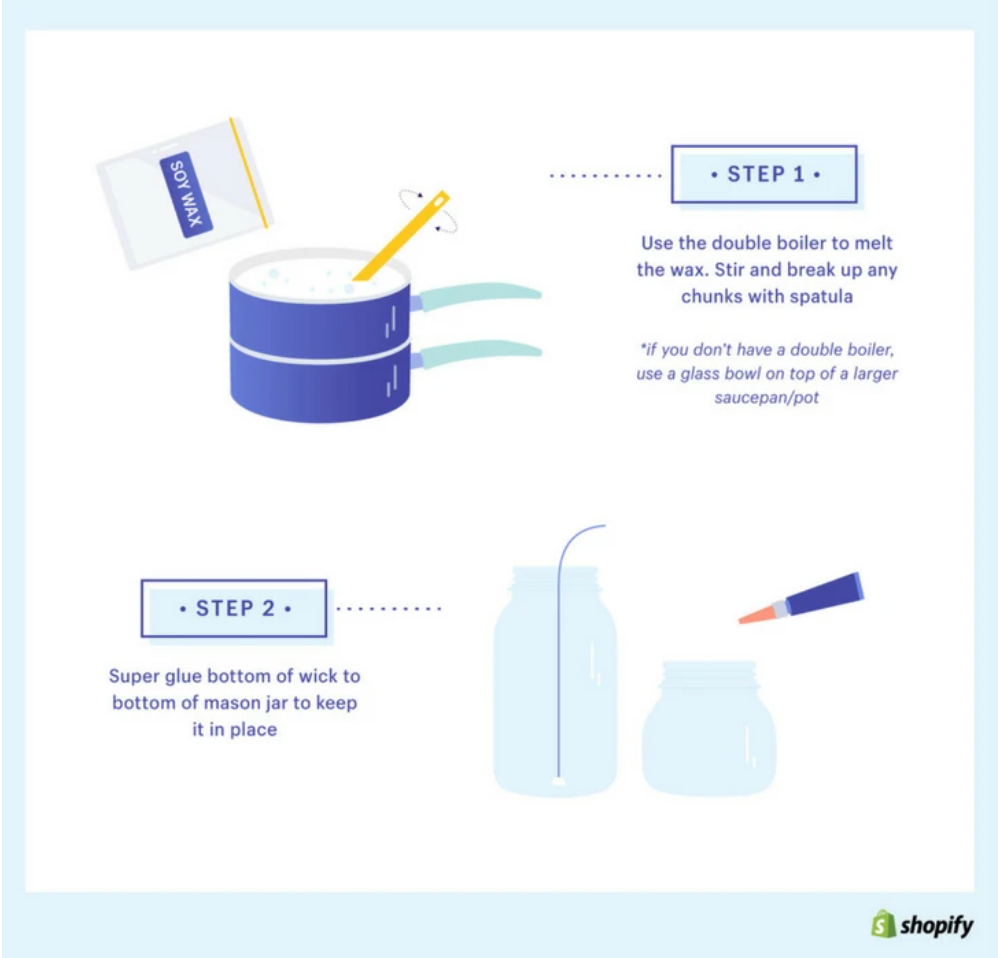
Now, let’s prep your materials to get your candle wax ready. Take your soy wax and put it into your double boiler on your kitchen stove to melt. Fill the bottom pot with water and the top with the soy wax and turn the burner to medium heat. Stir the wax with your spatula, making sure you break up any chunks.
While the wax is melting, take your wick and glue the end to the bottom of your glass container. Allow glue to dry, which will keep your wick in place as you pour your wax.
Customize your candle mixture
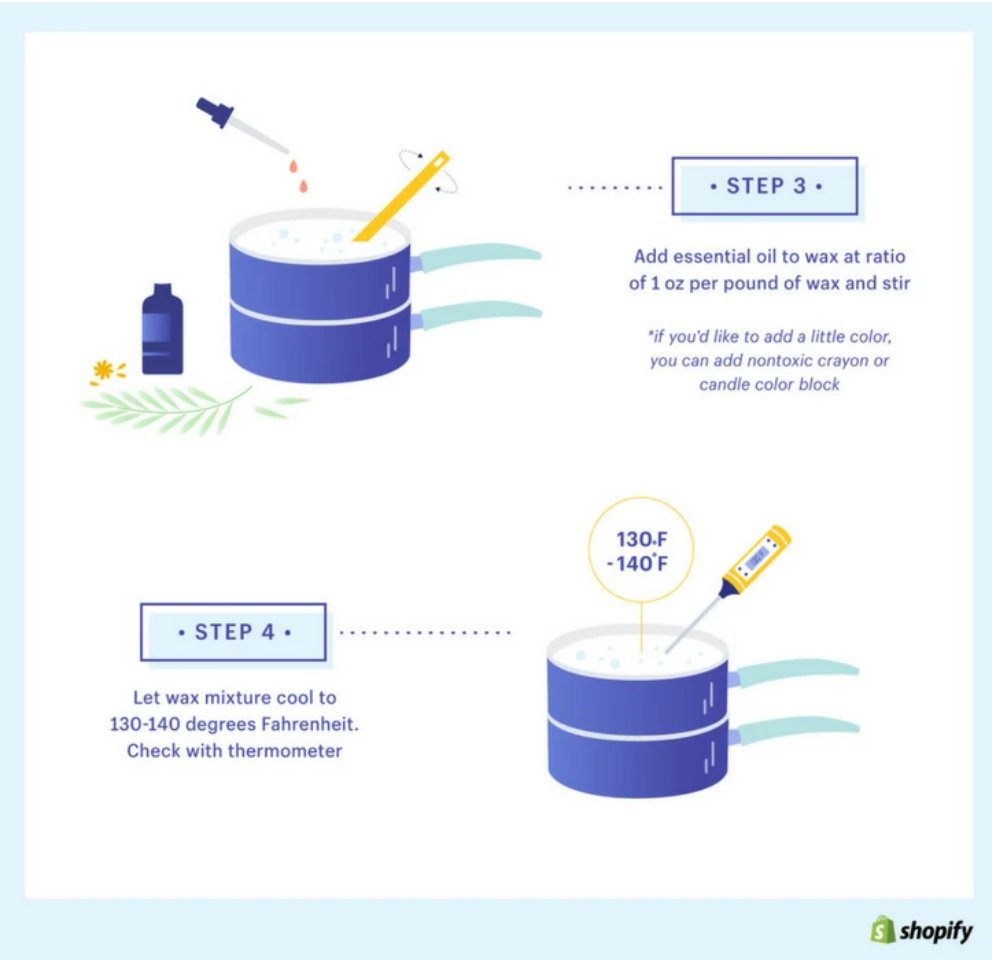
Once your wax melts, take your preferred essential oil and stir into your mixture at a ratio of one ounce per pound of wax. If you’d like to change up the color of your candle wax, stir in chunks of non-toxic crayons.
Once your ingredients are melted and mixed, let it cool to 130–140 degrees Fahrenheit. Check the mixture with your thermometer to ensure it reaches the correct temperature.
Prep your pour
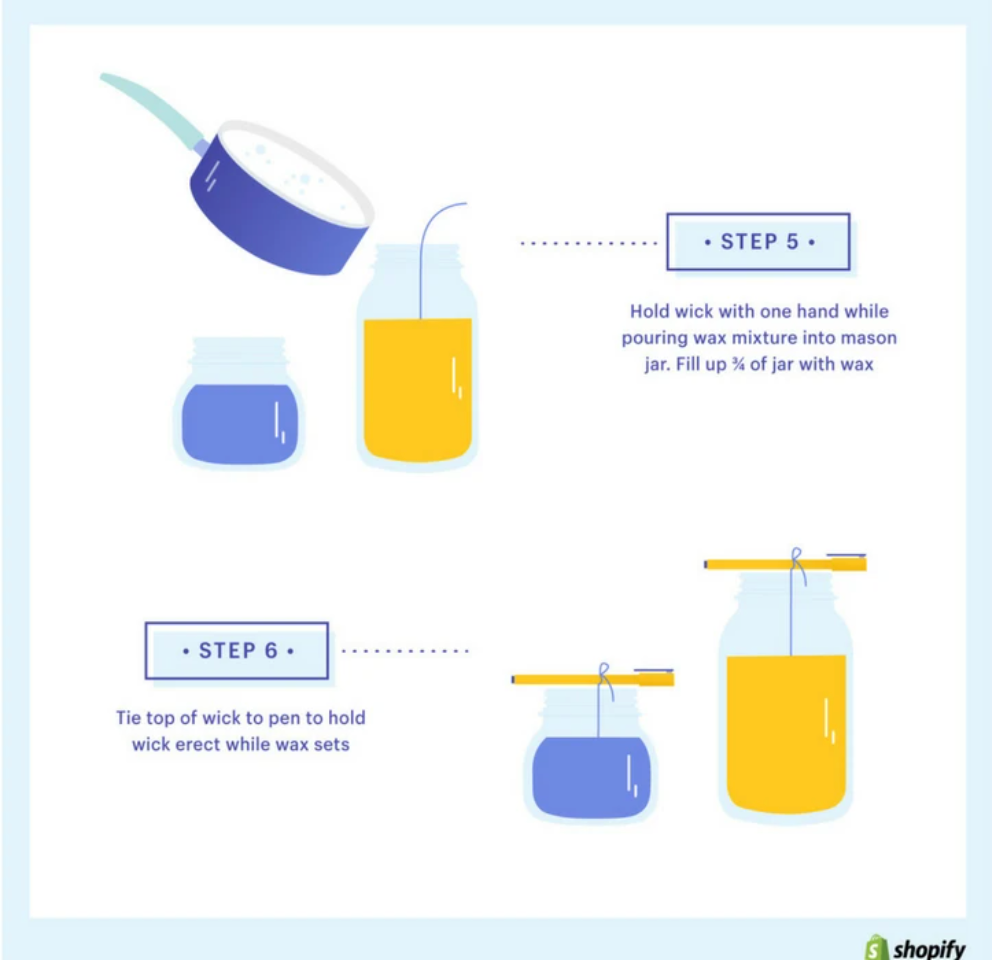
Now that your wax mixture is cooled to the correct temperature, it’s time to pour it into your jar. Hold the wick upright with one hand and pour the mixture out of the pan with the other. Fill up three quarters of the jar with the hot wax mixture.
To keep the wick upright, tie its end to the pen and set it across the opening of your jar.
Finishing your candle
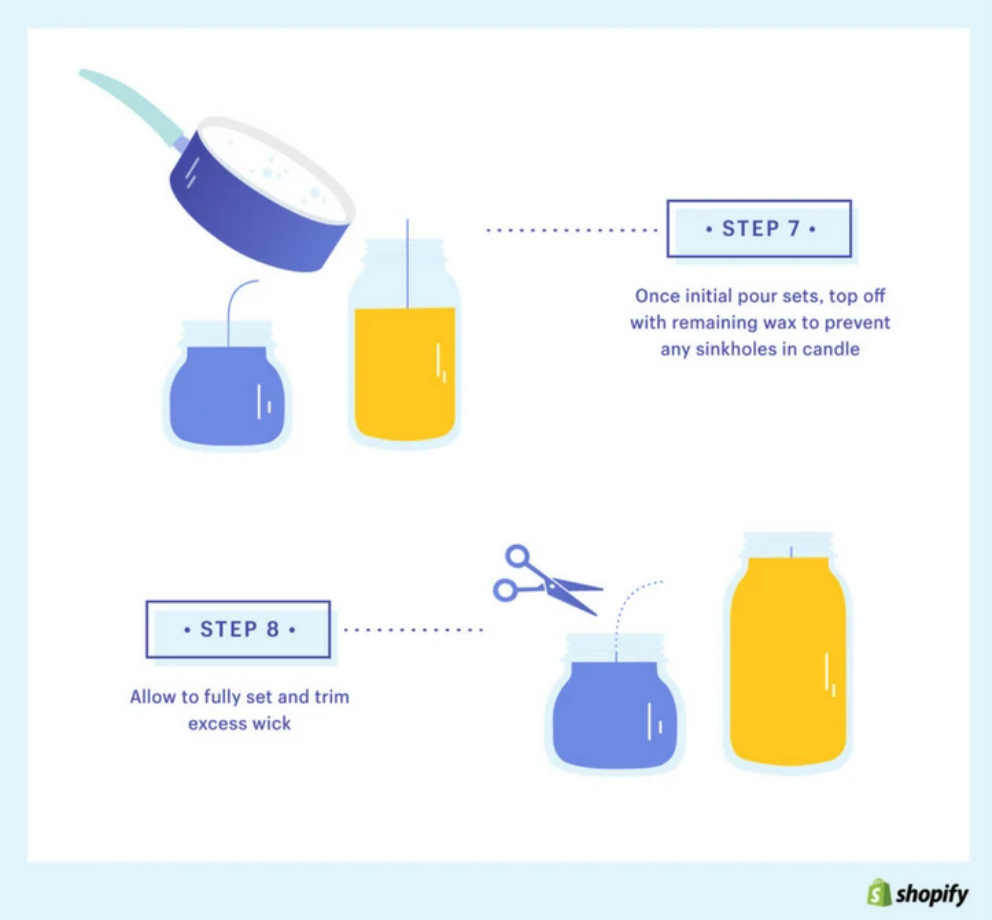
Allow your wax to firm up before beginning your final pour. You may see a small sinkhole in the wax around the wick—don’t worry, that’s normal. Here’s where we correct this issue.
Take the remaining wax mixture and pour the remaining quarter into the jar. Allow the rest of the wax to set completely. Once the wax is firm, snip off the excess wick with some scissors, and your candle is ready to burn!
Build your online store
Now that your candles are ready to go, where should you sell them? A great place to start is your own ecommerce store.
Creating an online store sounds like a daunting task compared to listing your candles on online selling sites like Amazon. But these marketplaces cut deep into your profits and don’t let you express your brand freely. Your online store is not only more profitable in the long run, but acts as a digital home for your brand.
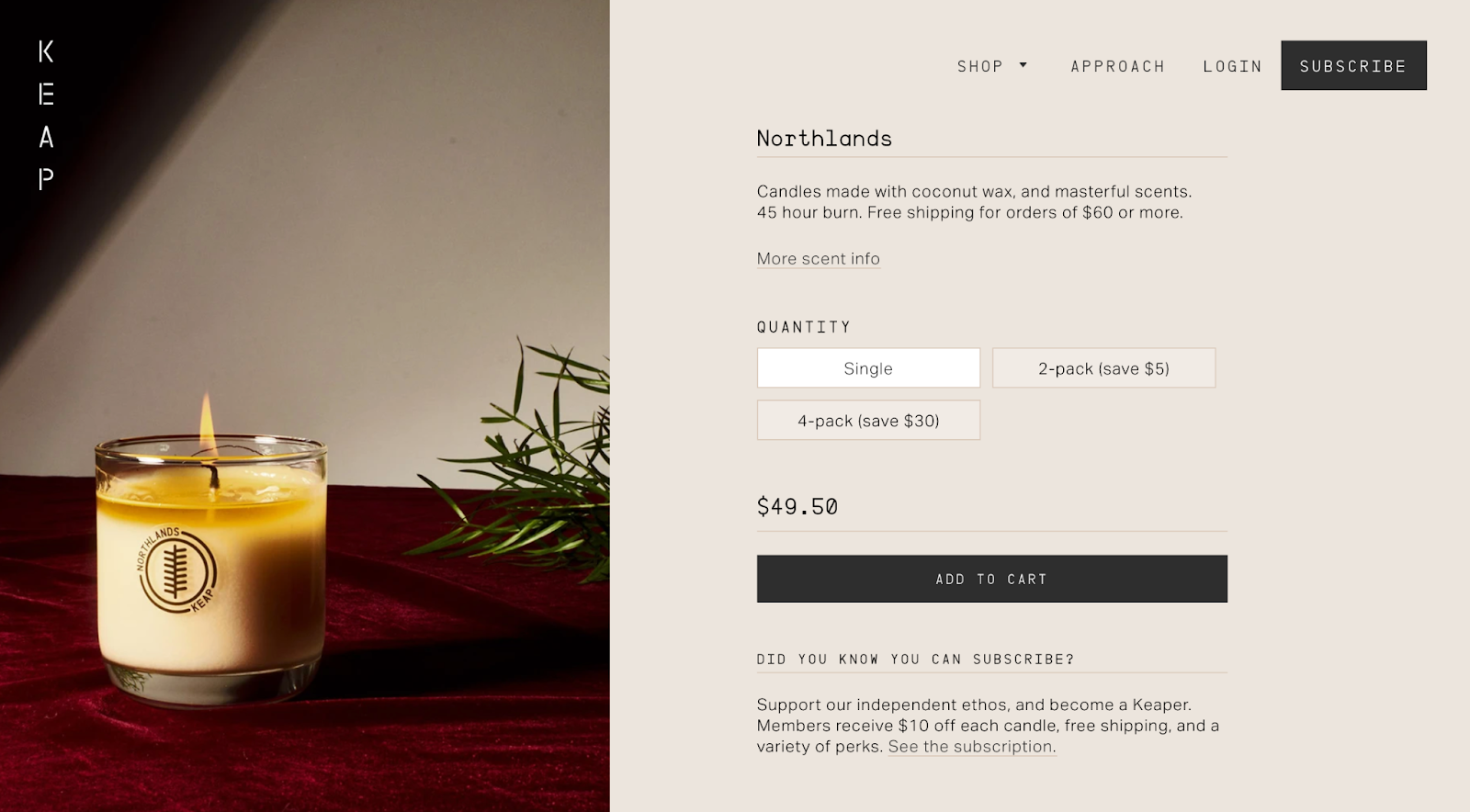
When it comes to building an online store, Shopify is the simplest way to start. You can build an ecommerce website without any coding or huge budget.
For a small $39 monthly fee, you get a beautiful storefront, SSL certifications, high-speed web servers, cart abandonment recovery, and other beginner-friendly marketing and sales tools. You even get access to the Shopify App Store, which offers over 4,000 plugins to improve your store and sell more online.
Create a marketing plan
You’ve got the recipe for success—now it’s time to figure out how to sell your soy candles (or other homemade candles).
Online
Like many business-to-consumer retailers, one of the most lucrative mediums to sell candles is online. You can use multiple digital platforms, like social media and your own ecommerce site, to reach potential customers around the world.
While every digital medium won’t be a successful sales platform for every merchant, here are a few places entrepreneurs can try to help them get started.
Although the following list doesn’t cover every channel merchants can explore for their fledgeling business, these are some solid options to help market your own business online.
- Instagram. Many lifestyle brands found great success building a sizable following on Instagram. Curate a feed of beautiful images related to your brand, stage photos of your candles to show off to customers, and reach a larger audience. You can also use Instagram to reach out to brand evangelists and provide a behind-the-scenes peek at how you make your candles.
- Pinterest. Home decor is a major category for users of Pinterest, which is one of the largests platforms customers use to find brands and products. So it’s wise for homemade candle merchants to consider Pinterest as a pillar in their marketing strategy.
- Snapchat. As another highly visual platform, Snapchat is another viable option for maker merchants. As one of the fastest-growing social media platforms with more than 200 million users, DIY hustlers can use the medium to market to an increasing audience.
- Giveaways and contests. As part of a social/content marketing strategy, you can use some of your merchandise as prizes in a series of giveaways and contests. Not only can these contests help you gain followers and build brand awareness, but you also have the opportunity to show off how well your products work.
- Email Marketing: Deliver your message (as well as promos, discounts, and other brand news) right to your customers’ inboxes.
Offline
Although selling online is a viable avenue for merchants, don’t be afraid to try selling IRL.
Homemade candles are compact and travel well—which makes them ideal for selling on the go. Your sweet-smelling home decor items are ideal for displaying in craft shows and pop-up shops and gives merchants the opportunity to get in-person feedback directly from potential customers.
Still not sold on selling in person? Going IRL for sales has a number of other benefits, including:
- Getting direct feedback. If you’re eager to improve your products (or just dying to hear what customers think), selling in person is a great way to do it. Meet your target customers face-to-face, address their pain points, and get ideas for potential new products.
- Discover wholesale opportunities. Ready to scale your business? Or looking to explore selling B2B? Markets and fairs are ideal events to meet wholesale buyers and establish a foundation for such a relationship.
- Build your online following and email subscribers. Whether you’re aiming to grow your social audience or build your email list, use pop-up shops and markets to connect online. When visitors show up at your booth or shop, ask them to subscribe to your email list or follow your branded social channels for new products, discounts, and giveaways.
- Networking and inspiration. Connecting with fellow makers and entrepreneurs is also a major part of the draw for festivals, markets, and fairs. Meeting other merchants can inspire you with new ideas and help you come up with new solutions to shared problems.
Although physical sales require different skills than sitting at your desk, a little know-how and the right tools can make it simpler to make sales on the go. Use a mobile point-of-sale system like Shopify POS to help you set up your shop or booth at your next flea market, farmer’s market, craft fair, and/or maker fair, and keep transactions quick and simple.
Candle business tips
Whether you’re starting a candle making side hustle or kicking off full-time, keep these candle business tips in mind:
Take amazing product photos
Great product photography is key to convincing people to buy your candles. Make sure you can clearly see the shape and label of your candles. Up for a challenge? Stage an image of the candle in use in your home so shoppers can envision it in theirs. You can hire a professional photographer to take your photos or take high-quality photos with a smartphone.
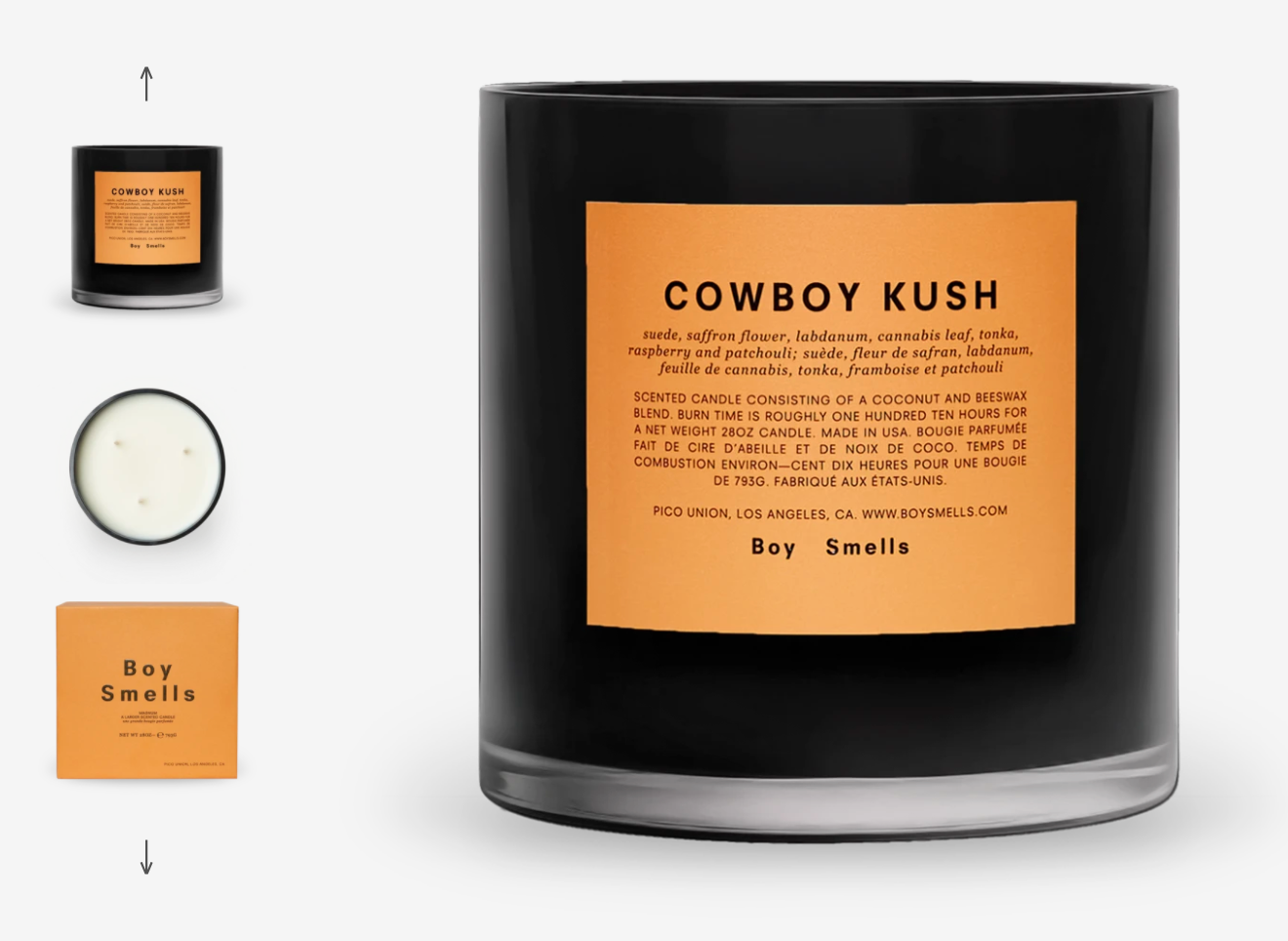
Create more selling opportunities
Having recurring customers is more profitable than constantly finding new ones. Test different cross-sell and upsell opportunities to drive more revenue from your existing customers. You could also offer subscription boxes, like Frostbeard Studio. The brand offers a Candle of the Month Club, where customers get a brand new candle every month for a set price.
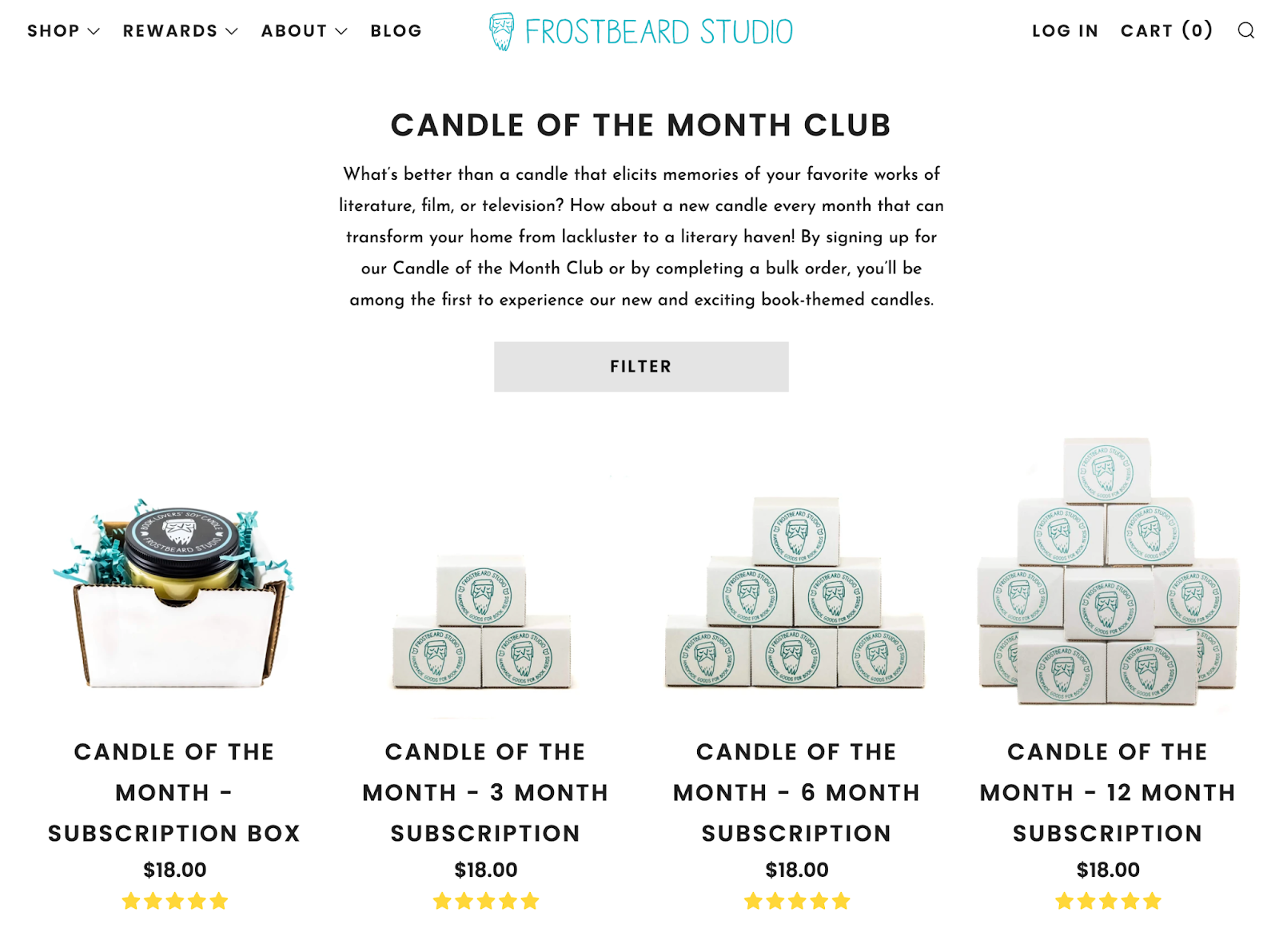
Expand your product line
Brands like Tofino Soap Company repurpose their scents for products like soaps, shampoos, balms, perfumes, and other things to make and sell online. It’s an easy transition for many candle makers because the scents are already developed, you just need to create the new product. You can then upsell customers based on scents they buy often, create scent-centric care packages, and reach new audiences.

Push holiday sales
Approximately 35% of candle sales happen during the Christmas holiday season, according to the National Candle Association, with 76% of buyers viewing candles as an appropriate holiday gift. Prepare for this season by creating holiday campaigns with special promos and ads targeted at potential buyers.
Stay on top of consumer trends
Stay up to date with what’s going on in your niche. Use resources like Facebook IQ, Think with Google, and Nielsen to understand customer pain points and track breakout trends. You can use this insight to come up with new product ideas, fragrances, and marketing campaigns to promote your brand.
Starting your candle making business
You’ve gotten this far, which means you now have a great grasp on how to get started with your own homemade candle business. With the tools and knowledge above to help you make and sell your homemade candles, you can move forward to create your own income stream using your DIY skills.
Have ideas on how to make candles for novice DIYers? Share your tips and advice in the comments section below.
Ready to create your online store? Start your free trial of Shopify—no credit card required.
Candle business FAQ
Is candle making a good business?
How much does it cost to start a candle business?
Is candle making profitable?
How do I start a candle business from home?
- Do market research
- Build your brand
- Create a business name
- Write a business plan
- Make candles to sell
- Build your online store
- Market your candle business
